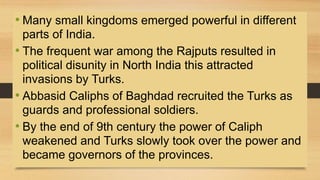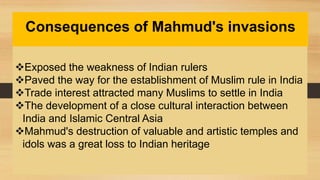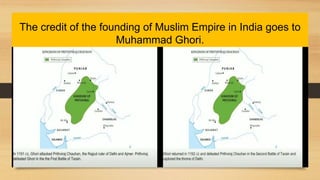50uddwvcqyoj7rqdtpdz-signature-45e34c79407a1e85d516a6bdbfed84ecc5f9b5a4f87370a99885af8b272dba7f-poli-210223035025.pdf
- 1. Turkish invasions in North India By : Kamlesh Khanna
- 2. • Many small kingdoms emerged powerful in different parts of India. • The frequent war among the Rajputs resulted in political disunity in North India this attracted invasions by Turks. • Abbasid Caliphs of Baghdad recruited the Turks as guards and professional soldiers. • By the end of 9th century the power of Caliph weakened and Turks slowly took over the power and became governors of the provinces.
- 5. MAHMUD GHAZNI • One governor, who conquered Ghazni in Afghanistan started a new lineage of rulers known as Ghaznavis. • Mahmud Ghazni was born in 971 CE. • He ascended The throne in 998 CE.
- 6. INDIA AT THE TIME OF INVASIONS BY MAHMUD OF GHAZNI • He decided to invade North West India where the Gurjara- Pratihara Empire had become weak due to frequent battles with Pallavas and Rashtrakutas. • Mahmud Ghazni invaded India 17 times in 27 years (1000 - 1027 CE). He wanted to build a powerful Empire and needed the money to raise a powerful army to succeed. • V
- 8. THE PLUNDER OF SOMNATH
- 9. Consequences of Mahmud's invasions Exposed the weakness of Indian rulers Paved the way for the establishment of Muslim rule in India Trade interest attracted many Muslims to settle in India The development of a close cultural interaction between India and Islamic Central Asia Mahmud's destruction of valuable and artistic temples and idols was a great loss to Indian heritage
- 10. DO YOU KNOW ?
- 11. MUHAMMAD GHORI • Muhammad Ghori was the ruler of a small Kingdom of Ghor in Afghanistan. • He conquered Ghazni. • He placed it under the charge of his brother and decided to turn his attention towards India to expand his Empire.
- 12. The credit of the founding of Muslim Empire in India goes to Muhammad Ghori.
- 13. Muhammad Ghori's dream of establishing an Islamic Empire would have been incomplete without conquering Kanauj. A fierce battle took place between the Muslims and the Rajput. The power of Rajputs was crushed, King Jaichand was defeated and Muhammad Ghori occupied Kanauj and Banaras. Muhammad Gauri did not have a child of his own. He put his territories under the charge of his trusted slave and general, Qutubuddin Aibek.
- 14. DO YOU KNOW ?
- 15. DIFFERENCE BETWEEN MAHMUD GHAZNI • To propagate Islam and gain popularity among Muslims • To looted and plundered India • Did not appoint governors MUHAMMAD GHORI • Founder of Muslim empire in India • To set up an Empire • Appointed faithful generals who continued to expand the kingdom
- 16. Reasons responsible for the defeat of Indian rulers • The disunity among Indian rulers • The caste system • The common people were dissatisfied as they had no contact with the rulers • Some Rajput rulers helped the Turks against their own country • The feudal system where the land owners were very powerful, weakened the power of kings • Indian Army's used old methods of war equipment and elephant.















